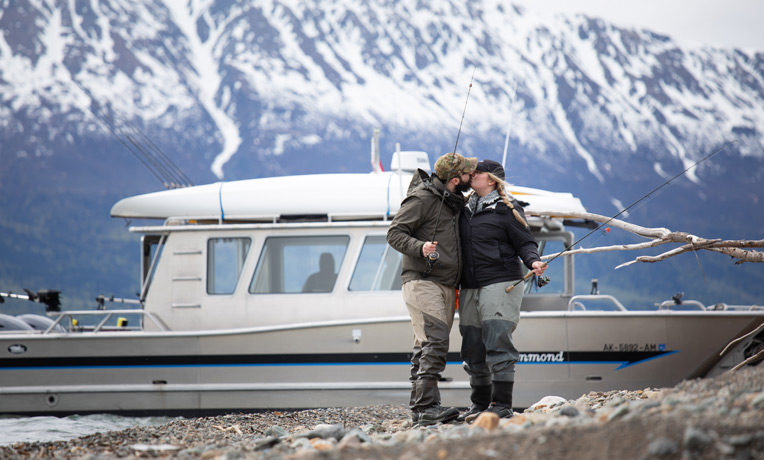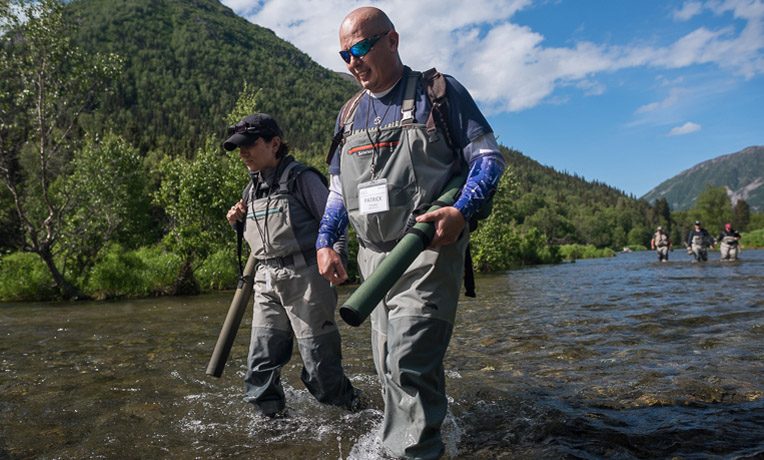God worked in the hearts of a combat-wounded Army veteran and his wife while they were in Alaska through Operation Heal Our Patriots
When Army Staff Sergeant Patrick Gonzalez and his wife Christa heard about Operation Heal Our Patriots from a friend earlier this year, they were hopeful the project could help turn their marriage around. They applied and were accepted for Week 1 (May 29-June 3) of this summer’s program, which brings combat-wounded veterans and their spouses to Alaska for a time of Biblically based marriage enrichment and then follows up with them for years to come.
Problems had plagued their relationship for years, and they were not even sure if they would make it to Alaska. Christa considered it their “last resort.” Patrick said he only felt confident they were actually going to go when they boarded the first plane.
Living with the Wounds of War
Many days retired Army Staff Sergeant Patrick Gonzalez goes to bed—for real—at about 7 in the morning and sleeps only until about 9:30 or 10 a.m.
He tries to sleep at night, but his post-traumatic stress disorder (PTSD) and anxiety keep him up. He lays there restless. He hears a noise and he has to inspect the cause. He looks inside. He searches outside. Or he has a nightmare and can’t get back to sleep.
When he gets up at 10, it takes a while because of the pain he’s in. His back is in very bad shape. He’s had two surgeries and needs three more. He has arthritis in his knees and ankles, a shattered elbow, and a traumatic brain injury (TBI). He’s hardly the athlete he was when he played minor league baseball in San Antonio.
What Patrick, 43, does the rest of the day depends on his pain and stress level. Maybe he won’t do much of anything. A migraine can cripple him for days.
Maybe he’ll do a little woodworking. “To do something with my hands,” he said.
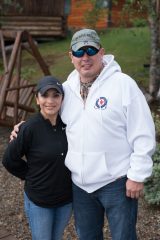
Patrick and Christa pause before kayaking on their first full day in Alaska.
When his four children, ages 12 to 16, get home from school, maybe he’ll play or go fishing with them. “I try to do stuff now I wasn’t able to do before [while deploying the military],” he said.
One of his former soldiers might call. He’ll read to them from the Bible and provide Christian counsel.
He really can’t work. The physical pain and the PTSD are too much. His wife of 17 years, Christa, is his designated caregiver.
The situation has been difficult to say the least since Patrick was wounded December 9, 2006.
Dead for Four Minutes
Patrick, who joined the Army in 1993, was a squad leader for an infantry platoon near Baghdad, Iraq. They were out on patrol. His gun truck ran over some Christmas lights that tripped an improvised explosive device, those damnable homemade bombs that have maimed and killed thousands of our soldiers during the lengthy war on terror.
The bomb blew up right under his seat. He was thrown into the top of the vehicle, ruining his spine and causing a traumatic brain injury. His driver lost his right leg. His radio man, Specialist Nicholas Steinbacher, 22, died on his birthday. Patrick had given him a banana that morning, so he’d have something to open.
A medic rushed to Patrick, found no vital signs, no breathing, and pronounced him dead. When the medic went to the driver, the driver told him to check on Gonzalez again. He did as told, took Patrick out of the vehicle, and successfully resuscitated him. Patrick—”dead” for four minutes—was then medevacted away.
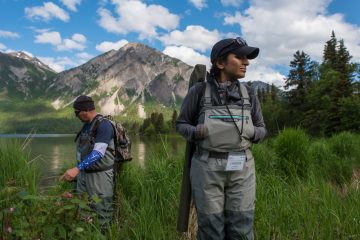
“Tranquil.” That’s how Christa described the setting as she and Patrick fished an Alaskan stream.
He ended up in Germany for about a month. Patrick was not quite clear with Christa on the extent of his injuries, and she was anxious. Her worries only increased when he skipped a scheduled video call with his family.
“I didn’t want them to see me like that,” he said. He was in a wheelchair at the time and his face was still battered from the shrapnel.
Eventually he was flown back to San Antonio and his family.
“When I finally saw him, I knew he was OK,” Christa said.
Patrick was OK in the sense that he was alive and back with those who love him. But he bore scars—physical, mental, and emotional. He would longer be the strong soldier, the squad leader, he once was. He became a part of the Warrior Transition Battalion at Brooke Army Medical Center, and was given medical retirement in 2008.
Ups and Downs After the Military
Patrick’s boldness for Christ actually increased as he transitioned out of the military. Though he was saved in 1998, he had been reluctant to share his faith with his fellow soldiers for years. After his injury, he seized opportunities to encourage his guys and point them to Christ. He says that they tell him: once we would have followed you to hell and back on the battlefield, but now we will go the pearly gates with you.
The Gonzalez family moved to Haines City, Florida—15 minutes from Disney World—after their time in San Antonio. They had a Bible study in their home at one point. Patrick continues to minister to veterans over the phone, bringing in Christa to mentor wives as well.
“People who he served with will call him up and he’ll talk. He ministers to them quite a bit,” Christa said.
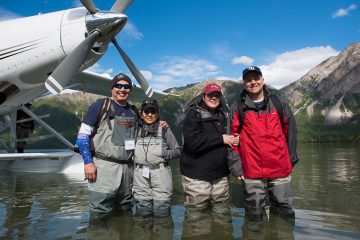
Patrick and Christa joined Air Force Master Sergeant Steve Light and his wife Cara for a fishing excursion.
“I start a conversation, and then the next thing I know I’ll have a Bible in my hand.” Patrick, a licensed minister, said. Sometimes he doesn’t even remember what he told them—a symptom of TBI—but he knows where to point them to—the Word of God.
But, especially over the past few years, Patrick and Christa’s relationship has been suffering. Patrick’s back is not getting better. “I know I’m going to be stuck with the pain for the rest of my life,” he said.
His PTSD too remains a daily battle. When he begins rubbing his face and head—his tell sign—Christa knows he’s agitated. She and the kids can withdraw. Patrick does the same. “I’ll go to my room and start reading my Bible,” he said. That’s the ideal in a less than ideal situation.
It’s the heart issues that were really bothering them though. “We took each other for granted and started having problems,” Patrick said. “Helping everyone else I was neglecting our marriage.” Argument after argument closed each day.
Restoration Begins in Alaska
Christa felt exhausted by years of internal struggle when the couple finally arrived in Alaska for their Operation Heal Our Patriots experience. Patrick had changed post-injury and learning to accept the “new” Patrick has been difficult for her. “Because he can’t do the things he used to do, I was seeing that as a sign of weakness,” she said. Contempt had crept in her thinking.
Patrick blamed Christa in a sense for some of his struggles. His words and attitude toward her were not encouraging.
In Alaska, their relationship was refreshed as they enjoyed fishing, hiking, and wildlife watching together in the wilderness. The beauty—and tranquility—of God’s creation was restorative. Even greater healing came as they listened to our retired military chaplains in marriage classes and in private spiritual counseling. God began to transform their hearts and minds. They started talking and working through issues at night rather than fighting. They looked at the Scripture together. They understood they’d lost focus on God and His Word.
“The classes the chaplains are doing are really helping us out,” Patrick said. “At night at the cabins we’re actually talking to each other.”
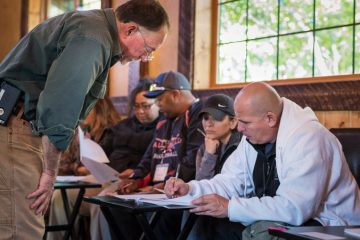
Chaplain Jim Fisher works with Patrick and Christa during one of eight marriage classes during their week in Alaska.
Christa started letting go of the bitterness that had been building inside her. She realized her thinking needed to change. “We need to adjust to the new Patrick,” she said, and focus on what Patrick can still do.
Patrick made a commitment to leave behind the negativity that had characterized the way he talked to his wife. He said he wants to stop chopping down Christa and start building her up.
“This [experience] is what I was hoping for. If we didn’t have this, I don’t know where we would have ended up at,” Patrick said. “It’s a real true blessing. I just love the way the Lord works.”
The biggest lesson these two believers learned in Alaska: “You can’t take your eyes off the Lord,” Patrick said.
Please pray for Patrick and Christa as they continue the hard work of restoring their marriage. Pray that couples in Alaska now and those who will be coming this summer will experience the love of Christ together in a fresh way.
